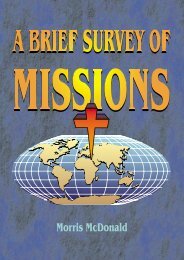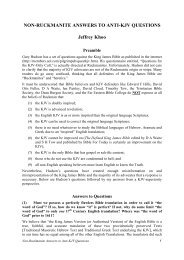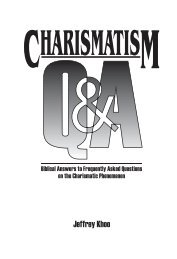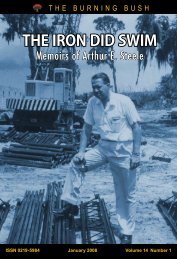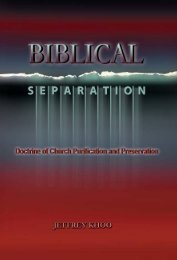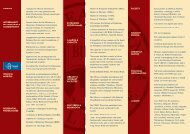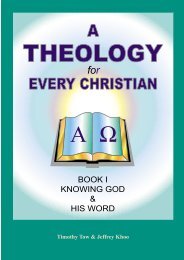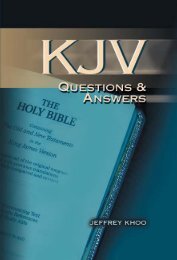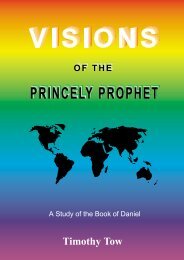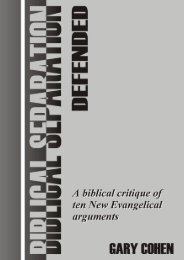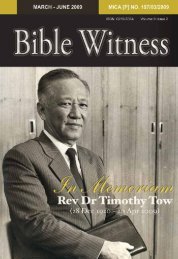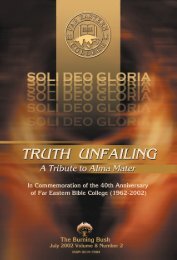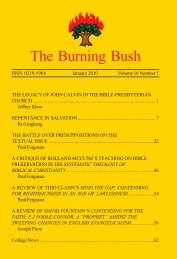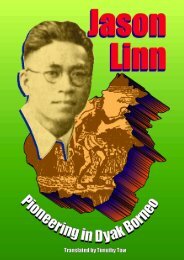50 Years Building His Kingdom - Far Eastern Bible College
50 Years Building His Kingdom - Far Eastern Bible College
50 Years Building His Kingdom - Far Eastern Bible College
You also want an ePaper? Increase the reach of your titles
YUMPU automatically turns print PDFs into web optimized ePapers that Google loves.
Life<br />
<strong>Bible</strong>-Presbyterian<br />
Church<br />
1 John 5:7,8 in Different English <strong>Bible</strong>s<br />
King James Version (1611/1769):<br />
For there are three that bear record in<br />
heaven, the Father, the Word, and the<br />
Holy Ghost: and these three are one.<br />
And there are three that bear witness<br />
in earth, the Spirit, and the water, and<br />
the blood: and these three agree in<br />
one.<br />
American Standard Version (1901):<br />
And it is the Spirit that beareth witness,<br />
because the Spirit is the truth. For<br />
there are three who bear witness, the<br />
Spirit, and the water, and the blood:<br />
and the three agree in one.<br />
manuscripts of the Vulgate testify in<br />
heaven: the Father, the Word and the<br />
Holy Spirit, and these three are one.<br />
And there are three that testify on<br />
earth: the (not found in any Greek<br />
manuscript before the sixteenth century)]<br />
New King James Version (1982):<br />
For there are three that bear witness in<br />
heaven: the Father, the Word, and the<br />
Holy Spirit; and these three are one.<br />
And there are three that bear witness<br />
on earth: the Spirit, the water, and the<br />
blood; and these three agree as one.<br />
Page 88<br />
Revised Standard Version (1952):<br />
And the Spirit is the witness, because<br />
the Spirit is the truth. There are three<br />
witnesses, the Spirit, the water, and the<br />
blood; and these three agree.<br />
New International Version<br />
(1973,1978,1984):<br />
For there are three that testify: the<br />
Spirit, the water and the blood; and the<br />
three are in agreement. [Footnote: Late<br />
“has no foundation in Erasmus’ work. Consequently<br />
it is highly improbable that he<br />
included the difficult passage because he<br />
considered himself bound by any such<br />
promise”. Yale University professor<br />
Roland Bainton, another Erasmian expert,<br />
agrees with de Jonge, furnishing proof from<br />
Erasmus’ own writing that Erasmus’ inclusion<br />
of 1 John 5:7f was not due to a socalled<br />
“promise” but the fact that he believed<br />
“the verse was in the Vulgate and<br />
must therefore have been in the Greek text<br />
used by Jerome”. The Erasmian “promise”<br />
is thus a myth!<br />
It has been suggested that the<br />
Johannine Comma did not come from the<br />
apostle John himself but from an unknown<br />
person who invented and inserted it into 1<br />
John 5 so that Christianity would have a<br />
clear Trinitarian proof text. Up until this<br />
point in time, no one has been able to identify<br />
this mysterious person who tried to<br />
“help” the church. He is probably a fictional<br />
character. In any case, it is highly<br />
New Revised Standard Version<br />
(1989):<br />
There are three that testify: the Spirit<br />
and the water and the blood, and these<br />
three agree.<br />
New American Standard <strong>Bible</strong><br />
(1995):<br />
For there are three that testify: the Spirit<br />
and the water and the blood; and the<br />
three are in agreement.<br />
unlikely that 1 John 5:7f is the work of a<br />
well-meaning interpolator. When we look<br />
at the text itself, the phrase, “the Father,<br />
the Word, and the Holy Spirit,” naturally<br />
reflects Johannine authorship (cf. John 1:1,<br />
14). An interpolator would rather have used<br />
the more familiar and perhaps stronger<br />
Trinitarian formula - “the Father, the Son,<br />
and the Holy Spirit”. “The Word” or “The<br />
Logos” of 1 John 5:7f points to the apostle<br />
John as its source, for it is distinctively John<br />
who used the term “the Word” to mean<br />
“Christ” in all his writings.<br />
There is nothing in the Johannine<br />
Comma that goes against the fundamentals<br />
of the Christian faith. It is thoroughly<br />
Biblical and theologically accurate in its<br />
Trinitarian statement. There is no good reason<br />
why we should not regard it as authentic<br />
and employ it as the clearest proof-text<br />
in the Scripture for the doctrine of the Holy<br />
Trinity.<br />
Rev. Dr Jeffrey Khoo<br />
(Article published in Foundation magazine,<br />
May-June 2000)



